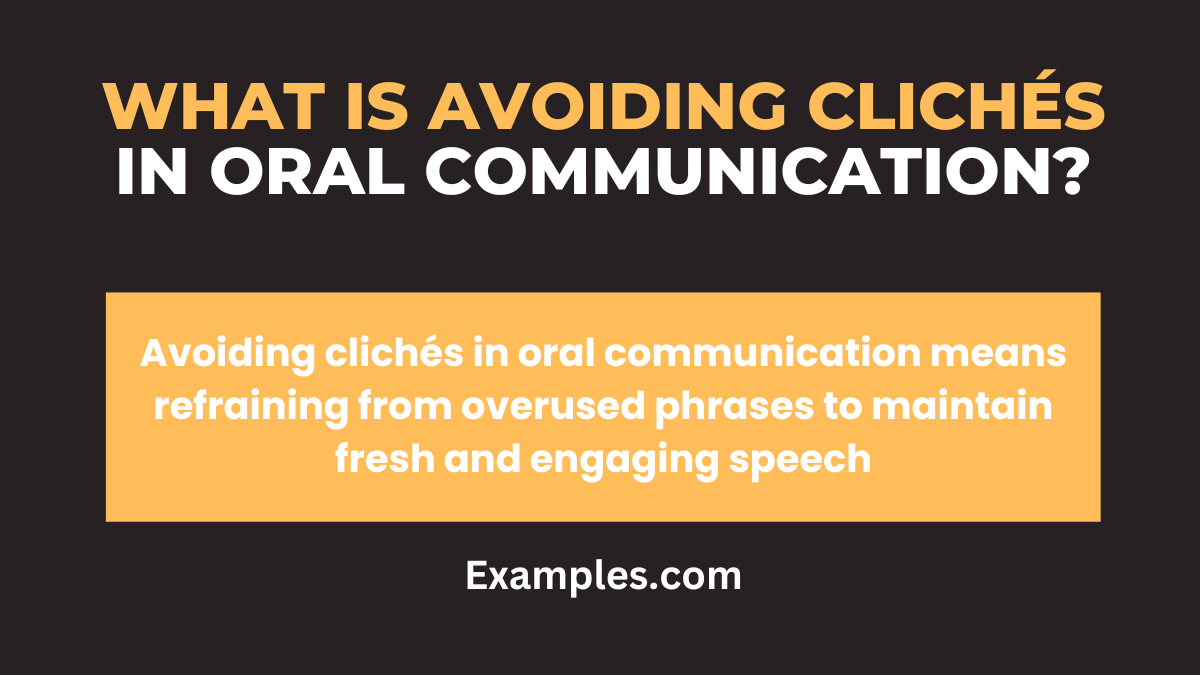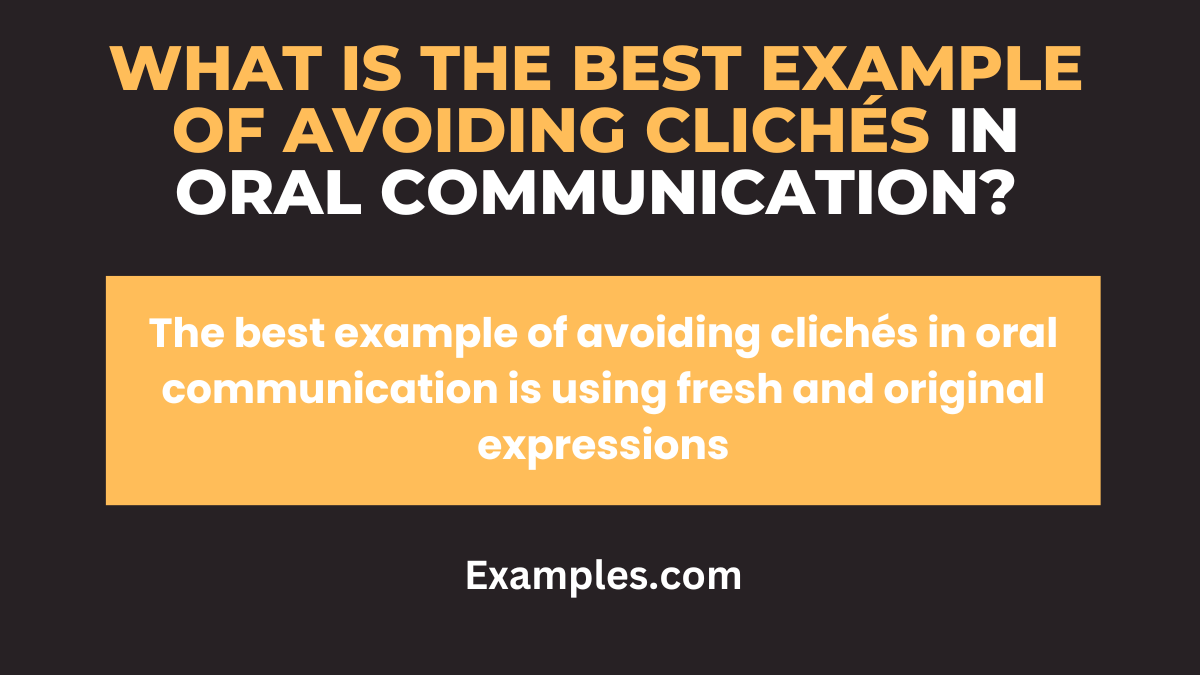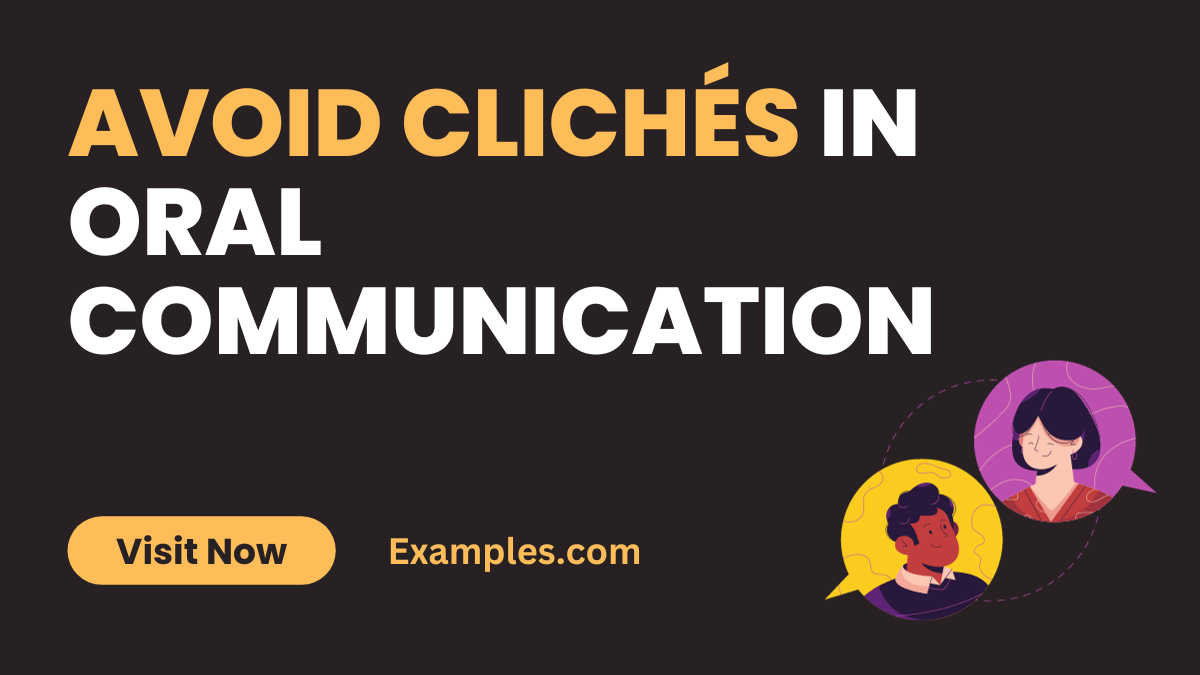Avoid Clichés in Oral Communication
In the realm of effective communication, the ability to Avoid Clichés in Oral Communication is a game-changer. This guide delves into the nuances of crafting original, impactful speeches and conversations. Steering clear of overused phrases not only enhances the clarity of your message but also reflects your creative thinking and understanding. Whether you’re addressing a small group or a large audience, avoiding clichés can significantly elevate the quality of your Oral Communication.
What is Avoiding Clichés in Oral Communication?

Avoiding clichés in oral communication refers to the conscious effort to steer clear of overused expressions and phrases in speech. This practice is crucial for maintaining originality and ensuring that your message resonates with the audience. By avoiding clichés, speakers can more effectively engage their listeners, convey their points with clarity, and demonstrate a deeper level of thought and creativity in their communication.
What is the Best Example of Avoiding Clichés in Oral Communication?

A prime example of avoiding clichés in oral communication is during a motivational speech. Instead of relying on overused phrases like “think outside the box” or “at the end of the day,” a speaker might use unique analogies or personal anecdotes. This approach not only grabs the audience’s attention but also conveys the speaker’s message in a fresh and memorable way, showcasing their ability to speak confidently and with clarity in Oral Communication.
20 Examples of Avoid Clichés in Oral Communication
Effective oral communication thrives on originality and authenticity. Avoiding clichés is crucial to maintain engagement and convey your message with clarity and impact. Clichés, those overused and tired expressions, can dilute the strength of your communication, making it less effective. They often signal a lack of active listening in oral communication and a failure to tailor messages to different audiences. Steering clear of clichés ensures that your oral communication remains fresh, relevant, and impactful.
1. Instead of saying “at the end of the day,” use “ultimately.”
Example: “Ultimately, our decision will be based on the project’s feasibility.”
2. Replace “think outside the box” with “explore creative solutions.”
Example: “Let’s explore creative solutions to address this challenge.”
3. Instead of “back to the drawing board,” say “let’s reconsider our approach.”
Example: “The feedback suggests we need to reconsider our approach.”
4. Swap “hit the nail on the head” for “precisely identified.”
Example: “You’ve precisely identified the core issue in your analysis.”
5. Instead of “low hanging fruit,” use “easily achievable goals.”
Example: “We should first target these easily achievable goals.”
6. Replace “win-win situation” with “mutually beneficial outcome.”
Example: “Our collaboration could lead to a mutually beneficial outcome.”
7. Instead of “it’s not rocket science,” say “it’s straightforward.”
Example: “The process is straightforward and easy to follow.”
8. Swap “don’t reinvent the wheel” with “build on existing ideas.”
Example: “Let’s build on existing ideas to enhance our strategy.”
9. Instead of “keep your eye on the ball,” use “stay focused.”
Example: “It’s important to stay focused on our primary objectives.”
10. Replace “bigger fish to fry” with “more pressing matters.”
Example: “We have more pressing matters to address at this time.”
11. Instead of “at this moment in time,” say “currently.”
Example: “Currently, our resources are fully allocated.”
12. Swap “pushing the envelope” for “expanding our boundaries.”
Example: “We’re expanding our boundaries with this innovative approach.”
13. Instead of “the ball is in your court,” use “it’s your decision.”
Example: “With the information provided, it’s your decision.”
14. Replace “take it to the next level” with “enhance or improve.”
Example: “We aim to enhance our performance in this quarter.”
15. Instead of “in a nutshell,” say “in summary.”
Example: “In summary, our plan focuses on three key areas.”
16. Swap “par for the course” with “to be expected.”
Example: “Challenges like these are to be expected in such projects.”
17. Instead of “burn the midnight oil,” use “work extra hours.”
Example: “To meet our deadline, we might need to work extra hours.”
18. Replace “beat around the bush” with “avoid direct discussion.”
Example: “Let’s not avoid direct discussion and address the issue head-on.”
19. Instead of “on the same page,” say “in agreement.”
Example: “It’s crucial that all departments are in agreement on this.”
20. Swap “last but not least” with “finally yet importantly.”
Example: “Finally yet importantly, let’s discuss our marketing strategy.
What are the Effects of Avoiding Clichés in Oral Communication?
- Enhanced Clarity: By avoiding clichés, your message becomes clearer. Without overused phrases, your audience can focus on the actual content of your speech, enhancing understanding in Oral Communication.
- Increased Engagement: Fresh and original expressions keep the audience interested and engaged, as opposed to tuning out familiar, predictable phrases.
- Improved Credibility: Steering clear of clichés demonstrates your depth of knowledge on the subject, thereby boosting your credibility as a speaker.
- Better Audience Connection: Original wording creates a more personal connection with the audience, fostering an environment of active listening in Oral Communication.
- Enhanced Persuasiveness: Unique and thought-provoking language can be more persuasive, as it shows thoughtfulness and effort in your communication.
Why Should You Avoid Using Clichés When Giving a Speech?
- Originality in Expression: Using original phrases instead of clichés makes your speech more memorable and sets you apart from other speakers.
- Ensures Accurate Understanding: Clichés can be vague and open to interpretation; avoiding them ensures your audience accurately understands your message.
- Reflects Thoughtful Preparation: Avoiding clichés shows that you have put thought and effort into preparing your speech, which can be appreciated by the audience.
- Adapts to Diverse Audiences: Not all clichés translate well across different cultures or demographics. Using clear and original language makes your speech more universally accessible.
- Encourages Active Engagement: When audiences hear clichés, they might tune out. Unique expressions, however, can pique interest and keep listeners engaged.
In conclusion, mastering the art of avoiding clichés in oral communication is not just about replacing overused phrases with original ones; it’s about cultivating a mindset of creativity and authenticity in your speech. By consciously choosing words that are clear, precise, and tailored to your audience, you can significantly enhance the impact of your communication. This approach not only makes your message more memorable but also demonstrates your commitment to effective and meaningful interaction. Remember, every word you choose is an opportunity to create a connection with your audience, so choose wisely and speak with intention.
For further insights into effective communication strategies, explore the resources available at Harvard Business Review. This esteemed platform offers a wealth of articles and studies on various aspects of communication, providing valuable perspectives from industry experts. Additionally, the Toastmasters International website is an excellent resource for anyone looking to improve their public speaking skills. Toastmasters International is renowned for its practical tips and techniques to help speakers of all levels refine their delivery and engage their audience more effectively. Both these resources are instrumental in guiding individuals towards mastering the art of impactful oral communication.



